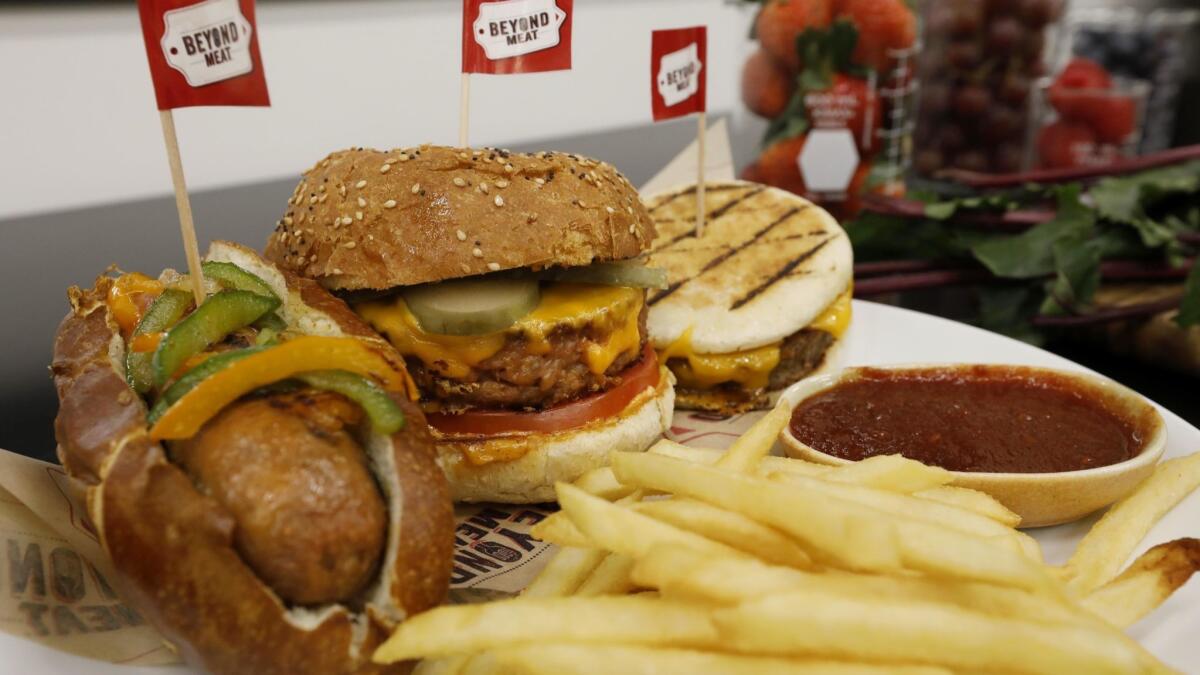Big vegan brands snag loyal customers when they’re in college

It was lunchtime in New Haven, Conn., and Yale University senior Charles Kenney was eating sausage braised in beer, onions and apples — a seemingly unusual choice for the vegan math major.
The brats, however, weren’t your standard pork kielbasa. It was a pea-based vegan sausage from Beyond Meat Inc., whose plant-based burger is also available every day at the school’s 14 residential dining halls alongside more traditional college fare such as roast turkey and macaroni and cheese. Kenney, who first tasted the brand on campus, said he plans to buy the meatless burgers and sausages at the supermarket once he starts graduate school at Rutgers in New Jersey next fall. “If I can afford it,” he adds.
That’s exactly what Beyond Meat was going for. The maker of plant-based protein products — which went public this week — brought its meatless burger to Yale two years ago in a bid to build loyal Generation Z customers before they even collect a paycheck. The idea is that if a brand resonates when a student is on a meal plan, it will still resonate when he’s 22 and buying his own groceries, and, hopefully, when he’s 32 and shopping for his family. Loyalties forged early run deep, and that’s important when a Beyond Burger can cost more than twice as much as standard ground beef at a grocery store.
“When you’re in college, you’re developing your brand preferences and buying habits,” said Adam Grant, head of the marketing agency Campus Commandos. Seeing these brands in the lunch line means they’re already familiar to students when they enter the real world — or, as Grant said: “That’s one more impression closer to them choosing you versus someone else.”
In the NBA, fake-meat diets are changing the game »
Beyond Meat’s initial public offering made a splash. The El Segundo company’s stock soared 163% on Thursday, its first day of trading, and Friday it rose 1.6%.
And Beyond Meat isn’t alone in courting college students. Just Inc., a startup making egg-free eggs and mayo, brought its plant-based mayonnaise to Cornell and UC Berkeley in 2015, and Impossible Burger arrived at the University of Chicago in 2017. By serving their products on campuses across the country, these mission-driven, young food companies are actively trying to avoid the fate their Big Food forebears suffered with millennials.
As Kraft Heinz Co.’s recent $15.4-billion writedown on its major brands made painfully clear, there was a steep learning curve when it came to those young adult consumers. Suddenly iconic products were being rejected as too processed, too unhealthy, too inhumane. The center of the store — the aisles where food giants hawk their shelf-stable cake mixes and canned soups — became marginalized. Fresh, healthy, organic and natural became the buzzwords that a new generation of socially conscious shoppers wanted to see — a trend that only has been exacerbated as the even more health-conscious and environmentally focused members of Gen Z come into their own.
“We really want to be where they’re at, like college campuses,” said Beyond Meat’s chief growth officer Chuck Muth, adding that its products are served on more than 100 campuses nationwide, in addition to the fast food chains it’s now entering. “It has been a target for us.”
For many Gen Z Americans, now roughly 7 to 22 years old, terms such as “factory farming” and “raised without antibiotics” don’t require explanation. They want authentic, transparent food brands that are slowing climate change, not contributing to it.
They’re more than twice as likely to classify themselves as vegetarians, vegans or pescatarians than their Gen X or Boomer parents, according to a survey by Bloomberg News and Morning Consult. Even the less restrictive are cutting back: Last year, 26% said they’re trying to eat less animal protein — a larger share than millennials (22%) and the nationwide average (19%), according to market research company Mintel.
Colleges and universities have been making significant efforts to upgrade their dining offerings, a response to a more demanding student body and an effort to stay competitive with rival schools. The higher education food-service industry is now as big as $18.3 billion in the United States, Technomic estimates.
Nationwide, case shipments of plant-based foods from food-service distributors to colleges and universities were up 14% last year, following a 10% bump the year before, according to NPD Group. The Humane Society of the United States has been training food-service professionals to work with tofu, lentils and branded plant-based foods, including at more than 80 colleges and universities last year.
Specialty foods such as meatless Impossible Burgers are bought the same way as standard items: through distributors. As with anything else on their menus, if the kids buying the meal plans weren’t picking up these new vegan products, the schools would stop serving them.
“Years ago it was, ‘Do you have vegetarian options?’” said Kurt A. Kwiatkowski, corporate executive chef at Michigan State University, which serves Beyond Meat’s burgers in multiple locations on campus and Just mayonnaise as a condiment at all of them. “Now it’s, ‘vegan, vegan, vegan, plant-based diet.’”
Like Beyond, Just’s marketing on campus often includes some branding in the dining halls, as well as sampling stations and the free publicity of enthusiastic students who, naturally, post on social media. Just allocates 25% of its staffing, resources and budget to colleges and universities, and its products are served at more than 60 schools, a figure it expects to double in the fall. “We are aggressively pursuing the college and university channel,” said Matt Riley, Just’s senior vice president of global sales.
Impossible Foods, maker of the famously bleeding Impossible Burger, is on at least 100 campuses, a spokesperson said, including University of Chicago and Vanderbilt University in Nashville. It has a college and university team within the company, spanning sales, communications, human resources and sustainability. At launch events featuring Chief Executive Pat Brown, someone from recruiting is often available to take resumes for internships and entry-level positions.
Of course, the big brands have long been at college, too. Products from Kellogg Co. are on more than 60% of the country’s campuses, and its Morningstar Farms and Gardenburger brands have been served for more than 20 years and have a 43% market share at colleges and universities, the company said. Conagra Brands Inc. products are also common in dining halls, and that company said its plant-based Gardein brand is particularly popular with students. At Yale, a recent student cooking competition counted Coca-Cola Co. and Barilla pasta among its sponsors.
Not all students want vegan food, though, and some progressive real meat brands have taken a similar tack. Niman Ranch, best known for its high-welfare pork, has focused on colleges for the last seven years, and its parent company, Perdue Farms Inc., said it sees the long-term upside of getting to these young consumers with a lifetime of purchasing ahead of them.
John Ghingo, president of Applegate — the natural and organic deli meat brand owned by Hormel Foods Corp. — said getting on campuses “is a big strategic priority.” The brand sends speakers to panels and offers plenty of free samples.
Commodity meat products are often served side by side with these newer offerings, but usually, if a product is lucky enough to get branded on a menu, it’s because the name itself — like Beyond Meat — tells a story that will resonate with an increasingly animal-welfare-minded, environmentally conscious student body. Michigan State chef Kwiatkowski said his school serves big-name meat companies’ products, too, but those companies’ names aren’t on the menus. “Our guests only have a short time that they’re in front of us,” he said, and “sometimes less is more.”
More to Read
Inside the business of entertainment
The Wide Shot brings you news, analysis and insights on everything from streaming wars to production — and what it all means for the future.
You may occasionally receive promotional content from the Los Angeles Times.










